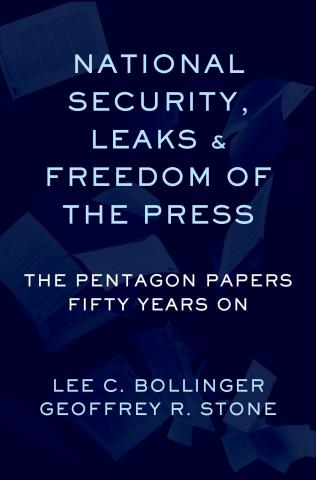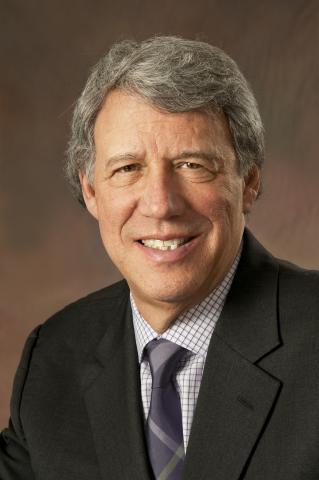Balancing National Security and Free Speech in the Digital Age
A New Book Co-Edited by Professor Geoffrey R. Stone Examines the Complicated and Evolving Terrain around Government Leaks
The world has changed in the half century since the US Supreme Court upheld the right of the New York Times and Washington Post to publish the so-called “Pentagon Papers,” a classified report containing information about America’s role in Vietnam. In the digital age, it is easier than ever for leakers to disclose information that could threaten national security. Potential publishers—anyone with an Internet connection—aren’t necessarily governed by the ethical norms of the traditional press, and the federal government’s growing reliance on private contractors means more people have access to government secrets. There are more secrets, too: in the post 9/11 years, the volume of classified information rose dramatically.
“[T]he risks of both too much secrecy and too much disclosure are arguably very different from what they were in 1971 and the ensuing decades,” Professor Geoffrey R. Stone and his longtime collaborator, Lee C. Bollinger, the president of Columbia University, write in their latest book, which examines the increasingly complex issues around government leaks.
But the response, the two free speech scholars argue, shouldn’t be to discard the current “Pentagon Papers” system, which allows the publication of even illegally leaked government secrets absent a “clear and present danger of grave harm to the nation.”
Instead, Stone and Bollinger advocate updating and refining how the intelligence community, media, and courts respond to leaks—and their new edited volume offers a roadmap.
In National Security, Leaks, and Freedom of the Press: The Pentagon Papers Fifty Years On (Oxford University Press, 2021), Stone and Bollinger include not only 16 essays that explore the tangle of policies, laws, norms, and practices undergirding the current regime, but they conclude with recommendations produced by their own commission of big-name experts.
“The idea of the commission was to bring together a group of experts from widely-varying perspectives and experiences in the hope of finding common ground,” said Stone, who participated in the commission with Bollinger and five leaders in national security or journalism. “In the end, both the essays and the commission report offer critical insights into the challenges facing our nation today and into the future. Our hope is that the volume offers important insights into an issue that will grow ever more important over time.”
In addition to the seven commission members, the book features the perspectives of 24 other contributors including journalists, scholars, former executive branch officials, and six WilmerHale attorneys who offer a review of legal developments since the Supreme Court’s 1971 ruling in New York Times Co. v. United States. The volume, which is divided into the “national security perspective,” the “journalist perspective,” and the “academic perspective,” takes on a variety of issues and topics, including the Edward Snowden leaks, whistleblowers, federal shield laws, and “Leaks in the Age of Trump.” The essays underscore the complexity, ambiguity, and untidiness of the current system—as well as the contributors’ overall belief that the current system, though flawed, has worked reasonably well. (Given the wariness that the media and intelligence communities have for each other, this agreement represents “a profoundly important collective judgment,” Stone and Bollinger say).
Among the essays is one by David Strauss, the University of Chicago’s Gerald Ratner Distinguished Service Professor of Law and a leading expert on constitutional law. In “Outlawing Leaks,” Strauss explores whether we need a new federal statute to determine when leaking or publishing leaked information should be a crime. His discussion highlights a paradox central to the current system—the difference between insiders and outsiders. Practically speaking, insiders (government personnel entrusted with secrets) can be sanctioned for leaking, but outsiders (the press) generally cannot. This presents a conundrum, given that the widening definition of “press” means that there are no longer clear gatekeepers. (A possible solution, Strauss says: the media could establish professional norms to distinguish “more or less responsible gatekeepers” without the need for government licensing or oversight, which could run afoul of the First Amendment.) Other essayists include such experts as Keith Alexander, the former director of the NSA; Lisa Monaco, ’97, current deputy attorney general; Michael Morell, the former acting director of the CIA; Avril Haines, the current director of national intelligence; Ellen Nakashima, the lead national security reporter for the Washington Post; and David Sanger, the lead national security reporter for the New York Times; and others.
The book closes with a series of recommendations by the expert commission, which in addition to Stone and Bollinger included John O. Brennan, former director of the CIA; Kathleen Carroll, the former executive editor and senior vice president the Associated Press; Stephen Coll, dean of the Columbia Journalism School; Eric Holder, former US attorney general; and Ann Marie Lipinski, curator of the Nieman Foundation for Journalism at Harvard University and the former editor-in-chief and senior vice president of the Chicago Tribune.
Broadly, the recommendations involve reducing overclassification, facilitating declassification, and creating alternatives to leaking; deterring leakers but reserving the most severe punishment for leakers who seek to harm the United States, including by disclosing information to foreign powers; and protecting core journalistic activity but allowing prosecution when the press engages in criminal activity with no First Amendment implications, such as hacking computer systems.
In the end, Stone and Bollinger write, there are no easy answers—and judgments may evolve over time.
“Reasonable people may disagree about these recommendations,” they and their commission say, “but all can agree that protecting national security and freedom of the press are both compelling interests and need not be in unnecessary conflict. Ultimately the public is the owner of all government information, including classified information, and how the government treats that information is a matter of vital concern.”
Stone and Bollinger are also the editors of the The Free Speech Century (Oxford University Press, 2018).

